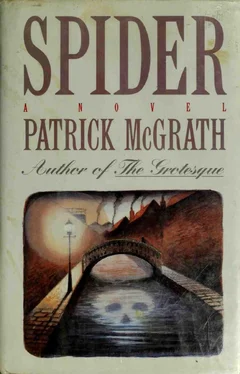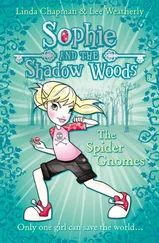The interview was not a long one. It took place in his office; he sat, I stood, with Mr. Thomas behind me at the door.
There was a file open on the desk; I realized that this was my file; somehow it hadn’t occurred to me that I had a file. He poked at his pipe with a matchstick. “You’re very young to be so sick,” he murmured, gazing up at me with the pipe clasped between his fingers. “How are you getting along on the ward?”
“Fine,” I said. (I’d been told to say this.)
“Sir,” said Mr. Thomas quietly.
“Sir,” I said.
“Like to try and make a go of it downstairs, Dennis?”
“Yes sir,” I said.
“Yes,” he murmured as his eyes returned to my file. Then: “Why did you do it, son? Any idea?”
“I didn’t mean to, sir. It was a mistake.”
“Sorry you did it, then?”
“Yes sir.”
“Well that’s a start. Eh, Mr. Thomas? That’s a start, eh?”
“Yes sir,” said Mr. Thomas from the door.
“Don’t suppose you’ll ever do it again,” said Dr. Austin Marshall. “Only got one mother after all.” He looked up with raised eyebrows; I had been told on no account to mention what my father had done. Mr. Thomas cleared his voice, a reminder. I stayed silent. The superintendent scribbled in my file for some moments, then said briskly: “Let’s try him out on a downstairs ward, see how he gets along. Block B, Mr. Thomas—can I leave the details to you?”
“Yes sir.”
“Jolly good. Don’t know any naval history, I suppose, Dennis?” he said, rising to his feet and waving vaguely with his pipe stem at a painting in oils of a sea battle. I couldn’t look at the thing, all that smoke and blood, screaming men in a burning sea as mainmasts were shattered and cannons belched flame, I could hear it, I could smell it, I wanted no part of it. “No, of course you don’t,” he said. “Still, you should, East End boy like yourself. It’s the Royal Navy made this country great, am I right, Mr. Thomas?”
“Quite right sir.”
“Jolly good then. Well off you go.”
Off we went, and so began my first stint on a downstairs ward. In later years I found it to be generally true that you only got to see Dr. Austin Marshall when you least needed him. Odd, eh?
The sea gull has settled on the pilings in the river and I seem unable to tear my eyes away from it. Ugly fat thing, with its beady eyes and webbed feet, now it lifts its hooked beak and lets out a screechy croak, you can imagine that beak coming at your face, pluck out an eye like a cockle, leave an empty socket and a bloody cheek—bloody cheek! Bloody nerve! Bloody nerve, nerve, nervous disease—I hate birds. The water’s boiling and frothing round my pilings now, whitecaps further out, strong current running, wash you out to sea like a scrap of flotsam, death by water, death by gas, death by hemp hemp hemp: they should have strung Horace up by the neck and let him swing. Horace—Horrors! Horrors Cleg! Horrors and his bird Hilda, they should’ve strung’em both up! Tower Bridge a dim gray structure of pencils and string against the failing light of this blustery afternoon, long strips of dark gray cloud sweeping out across the western sky, a few ragged, jagged tears between with the light shafting through, me on my bench leaning on the umbrella as the wind spits bits of river in my face and the gull lifts off the piling with more screechy croaks and an untidy flap of dirty wings before wheeling off on the wind and letting me rise at last to my feet and shuffle off home.
Upstairs without being seen and out with the book. Like a fox, the Spider, for when she found my rope and tablets in the fireplace she didn’t find the book: I was just too clever for her. For inside the flue, directly behind the mantelpiece that sticks out over the gas fire, there’s a narrow shelf, a ledge, and I stand the book on this ledge and wedge it firm with an upright brick. Only one way to retrieve it when it’s wedged on its ledge: flat on my back with my head up against the gas fire, my arm through the gap, into the fireplace, up the chimney—I grope, I stretch—and my fingers are just able to reach the brick and lift it down, and the book comes tumbling after; and despite the brown bag it is dirtier than ever now. Pencils: these I’ve been stealing from around the house, no sense letting her know what I’m up to, and I’m using the old Ganderhill system for these, the sock down the trousers. So out with my pencil, open the book, and gaze out the window at the sky, now dark, and return in my mind to the old days.
Life was certainly better on a downstairs ward. Tobacco and books; a room with a door; fresh air out on the terraces. This last was my great joy. There were benches on the terraces (my life has been a journey from bench to bench, and will end on a bench with a lid!) from which I had a clear view over the vegetable gardens and the cricket field, the wall down at the bottom, and beyond it farmland that gradually yielded to wooded hills in the distance. When the wind blew from the south it carried up from the farm a rich smell of manure, and this too gave me pleasure. For a lad who’d grown up on Kitchener Street, for whom the allotments and the working Thames were all he knew of nature, this sweep of countryside was true glory. And the skies it gave me! My skies were London skies, but these were blue, with high white clouds moving across in stately caravan, and my spirit exulted, something was awoken in your old Spider when first he met those skies, and it’s still there, faint now, and burning low, but it’s there. And I remember how, one day, sitting on a bench at the back of Block B, I watched the men at work in the vegetable gardens, in their flapping yellow corduroys and their green jerseys, and when I went back in (they gave us only half an hour on the terrace) the men in the vegetable gardens were still there, and I thought: this is the work for me.
It took years. At times I’d become agitated, I’d do something stupid, and back upstairs I’d go. Always John Giles was there to meet me, though his grin was a goonish one now, for after he bit off an attendant’s ear they’d pulled all his teeth out. John only got downstairs once in twenty years, even after they began giving him electric shocks; he’s up in hard bench today. But I was different, I was learning to give them a good lunatic, and as time passed, and Spider made his life more secure in the back parts, it became less and less vital to maintain my claims on the ward. The goading diminished, the agitation subsided, and I spent longer periods downstairs. I sat on the terrace and watched the men in the vegetable gardens, thinking: this is the work for me.
Yes, this was the work for me. Ah dear God, are they starting again? Is this them with their voices crackling at me from the light bulb again? And me thinking I wouldn’t go through another night of it. I look at my fingers—they seem so far away from me, at first I think I see a crab of some type lying there on the open page, a yellow crab with horny pincers, a creature unrelated to me. I follow it up my arm to my shoulder, I need to do this to confirm that the thing is a part of me, or at any rate connected to this composite, this loosely assembled and unraveling weave of gristle, husk and bone. For I am almost empty now, the foul taste in my mouth attests to this, and of course the smell of gas, and I wonder (such are my thoughts at night) what they will find when they cut me open after death (if I’m not dead already)? An anatomical monstrosity, surely: my small intestine is wrapped tightly around the lower part of my spine and ascends in a taut snug spiral, thickening grossly into the colon about halfway up, which twists around my upper spine like a boa constrictor, the rectum passing through my skull and the anus issuing from the top of my head where an opening has been created between the bones joining the top of my skull, which I constantly finger in wondering horror, a sort of mature excretory fontanelle (my hair would be matted and stinking but for the blessed rain that daily cleanses me). Since this occurred (late one night earlier in the week) I have tried not to eat, for the movement of matter through the intestines has become painfully vivid to me, a series of jerky spasms as though a worm of some kind were crawling round my backbone. Other organs have been compressed against my skeleton so as to create a void or emptiness in the trunk of my body, and I haven’t yet learned why this is occurring. One of my lungs has disappeared; there is a worm in the other but fortunately smoking remains possible. A single thin pipe takes water from my stomach (squashed flat and ridged against my rib cage) and this pipe alone drops through the void and connects to the thing between my legs that hardly resembles a formed male organ at all anymore. There is material rotting slowly inside me, the composting remains of organs I no longer need, and it is because the odors given off by this process have begun to seep through the pores of my skin (my skin! my husk, my shell, my rind!) that I have now wrapped my torso and all my limbs in newspaper and corrugated cardboard held in place with string, sticky tape, rubber bands, whatever I have been able to steal around the house. All this, all this I can live with; what preys upon my mind now is the thought that my body is being prepared for something, that I am being evacuated internally so as to make room for something else: and even as I write these words, even as I draw a wavering line beneath them, a loud cackle suddenly comes from the light bulb, and from the attic a volley of stamping that shakes the walls and sets the light bulb swinging on its cord, and I sit here terrified, clutching the table with both hands as the swinging bulb throws the room into wildly shifting blocks of light and shadow.
Читать дальше












